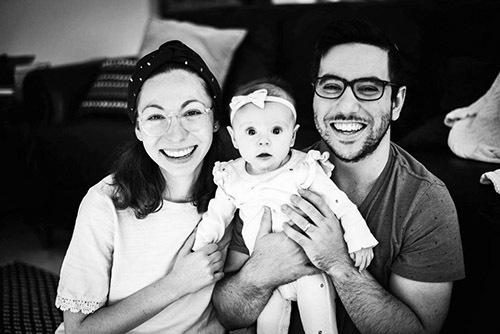
Josh Lankin, 28, made aliyah with his wife Jen from Washington Heights in September 2019. They have recently added an adorable baby girl to their family and live in Jerusalem.
Aviva: Where did you grow up and where did you go to school?
Josh: I grew up in Highland Park, New Jersey, and went to Rabbi Pesach Raymon Yeshiva (RPRY) in Highland Park-Edison. It was a very Zionistic school. There were always conversations about Israel and how important it is to the Jewish people, and that was always impressed upon me from a young age. For high school, I went to Torah Academy of Bergen County (TABC) in Teaneck, and Israel was a critical feature of our education there, too, as the Jewish homeland with religious and spiritual meaning.
Did you have any aliyah influence in your own home?
My parents raised us to be very Zionistic, and my grandparents were big supporters of Israel as well—it was ingrained into us from the early days. I was blessed to grow up in a home where Israel was always at the forefront, even if at the time we were not living here. It was always our dream, and we considered it to be the place where the Jewish people belong.
What was your final motivation for wanting to live in Israel when you finally made aliyah?
From the time that I was in yeshiva in Israel, I always knew that I wanted to move here eventually. After Jen and I got married, it was frequently a conversation we would discuss. Then, within a span of about five years, my parents and siblings all made aliyah.
What are you doing professionally in Israel?
We were fortunate to be able to bring our work with us when we made aliyah, and we’ve continued to work for American companies during U.S. hours. That’s been an interesting adjustment and challenge, but also highly convenient in some ways.
I work for a life-science consulting firm, Cerner Enviza, as a consultant for pharmaceutical and biotech companies that develop drugs and devices for clinical use. I work predominantly in research related to oncology (cancer) and rare diseases. I help companies develop drugs to treat these conditions and help them understand the value that their innovative products bring to the marketplace. I act as an adviser to many of the major pharmaceutical companies around the world, and I’m fortunate to be able to do this meaningful work. I know that every day I can impact the way that these medicines are developed and hopefully help patients that need better treatments.
Tell me about your aliyah experience.
Once you get the ball rolling, things tend to fall into place. I was fortunate because, as I was a full-time graduate student, my wife was the point person for this process, and she’s absolutely the reason that we’re here. Our aliyah was smooth since we have such a large support system here in Israel, and while most of our time here has been during the pandemic, we made the most of our time, staying close to family and getting ready for our recent addition, Adi, to join the family.
Is there anything that you miss about living in New York or New Jersey?
I miss all my other family members on the East Coast—my aunts and uncles, cousins, my brother and his family, and my wife’s older sister and grandparents. I miss them all terribly, but many of them recently flew in for my niece’s bat mitzvah, so we got to see them.
Do you have a message about making aliyah?
There are a lot of creative ways to make a life here, and life here is very, very nice. Make sure that you are making connections with people in your fields so that when you get here, the transition can be smoother. It’s different being in a place where the place itself has its own meaning, so that’s a new experience, and it definitely changes the way that you live day-to-day. It is a big adjustment, so make sure you have a support system. Not everyone is fortunate enough to have their immediate family here, but there are so many other people who are willing to help out new immigrants. If you think aliyah is not possible, it absolutely is.
By Aviva Zacks










